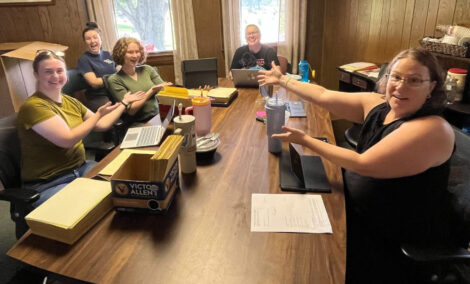House committee approves three property tax bills from Rep. Thomas
The Ohio House Ways and Means Committee approved three pieces of legislation sponsored by state Rep. David Thomas, dealing with property tax reforms, including two the governor vetoed.
The committee voted to limit unvoted property taxes collected by school districts, known as the 20-mill floor. The bill would limit the revenue districts can receive from the 20-mill floor to inflation, which Thomas, R-Jefferson, said would save Ohio homeowners nearly $1.7 billion over the next three years. It would start with the second half of the 2026 tax bills if approved by the state Legislature, said Thomas, who represents parts of Trumbull County.
“This is the big one” in terms of property tax reductions, said Thomas, vice chairman of the Ways and Means Committee.
Thomas and state Rep. Jim Hoops, R-Napoleon, had introduced a similar bill in March.
But the previous bill would have taken effect when a county did a property valuation, which occurs every three years, while the new bill calls for every county to start the change with the second half of next year’s tax bills.
Property taxes have skyrocketed in Ohio in recent years.
“Instead of receiving a 30% increase because of an increase in property values, it will be tied to inflation,” Thomas said.
Inflation has hovered around 3% per year.
“Had this bill passed in 2022, what would people be paying compared to what they’re actually paying now?” Thomas said. “It’s not retroactive, but we’re saying if we had a time machine and passed it in 2022 it would have saved about $1.7 billion. It’s a decrease from the increase.”
Every school district in the state is guaranteed to receive 20 mills. About 500 of the state’s 611 school districts have an effective rate that is below the guaranteed 20-mill floor, but 20 mills are still applied to the district’s value, Thomas said.
School district taxes are usually the largest part of a homeowner’s property tax bill.
The 20-mill floor is a main reason for the large increases in unvoted property taxes over the past few years, Thomas said, as values increased.
The bill doesn’t remove the ability for schools to receive additional tax revenue as property values increase, but ensures that taxpayers are protected from property tax increases caused by valuation spikes, Thomas said.
The Ways and Means Committee approved the new bill Wednesday along with two other standalone bills, sponsored only by Thomas, that were vetoed July 1 by Gov. Mike DeWine, a fellow Republican, as part of the budget bill.
The House was unable to get enough support during a special July 21 session to override two DeWine vetoes it planned to consider.
One gives county budget commissions — made up of the county auditor, treasurer and prosecutor — control over tax rates and levies.
The commission would be permitted to unilaterally cut property tax rates if revenues exceed expenditures, even if voters approved ballot initiatives for that funding.
The other requires school districts to include emergency and substitute levies in their 20-mill floor, which guarantees they receive at least 20 mills of funding even if they are below that amount. This would have put about 200 of the state’s 611 school districts off the floor.
The House will consider veto overrides in October and as early as when it next meets on Wednesday, Thomas said. The Legislature has until Dec. 31, 2026, to override the vetoes.
If there isn’t enough support for veto overrides, Thomas said his two stand-alone bills would move forward.
Thomas said if the latter should occur, he doesn’t expect DeWine to veto them.
“He has buyer’s remorse over vetoing them,” Thomas said.
Also, Thomas said he expects DeWine’s property tax reform committee to recommend giving county budget commissions the power to cut property tax rates. Its recommendations are due by Tuesday.
Public school officials and Democrats oppose the two provisions.

